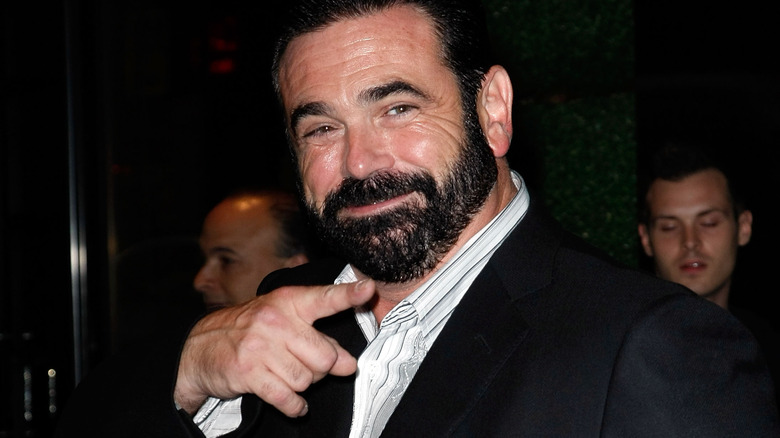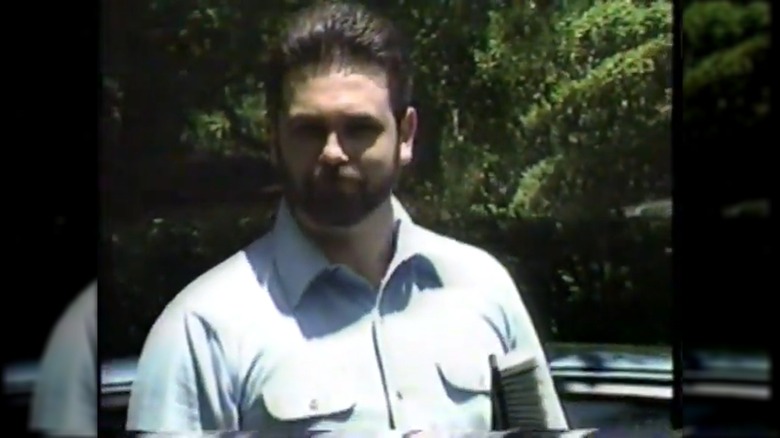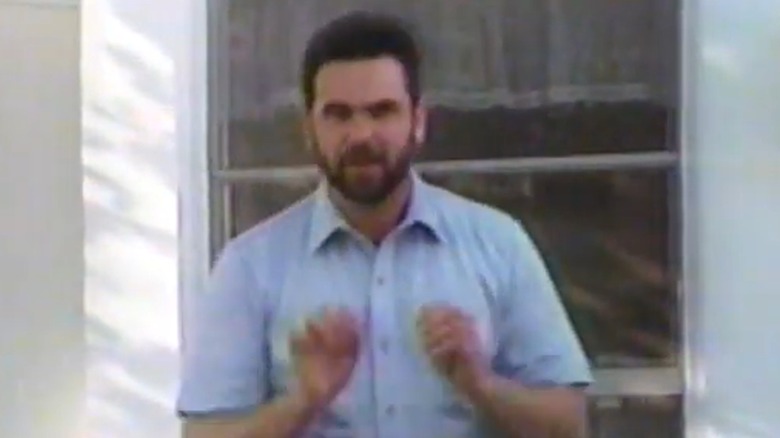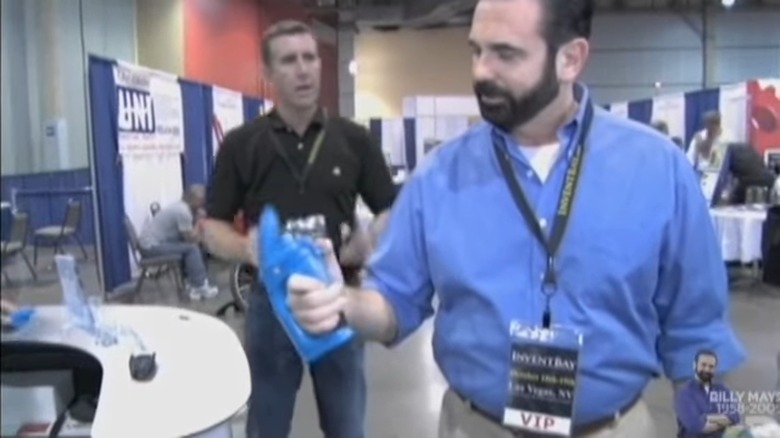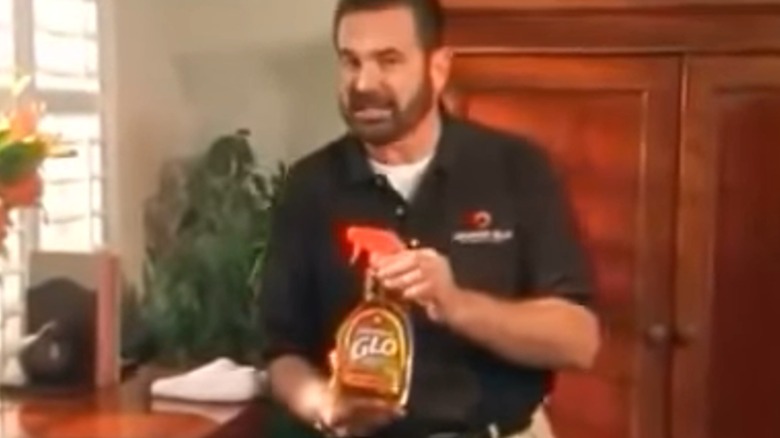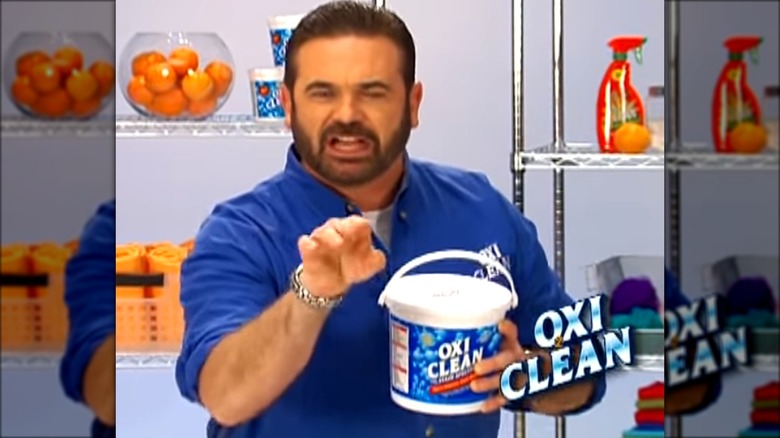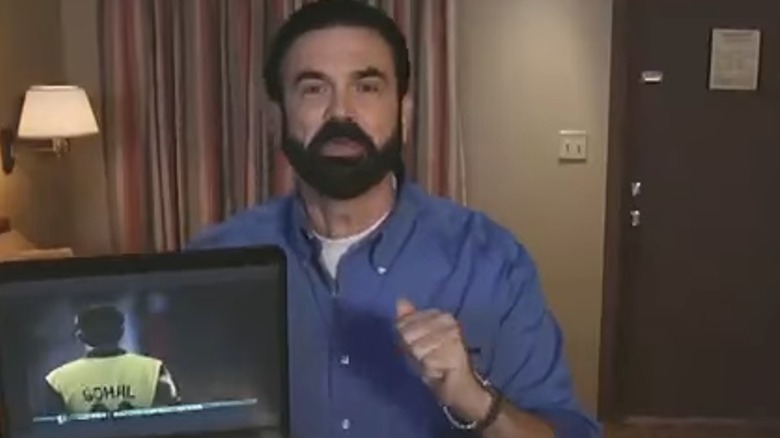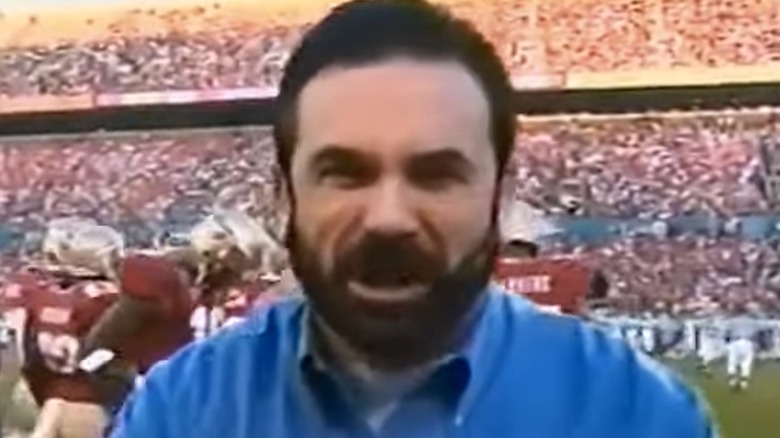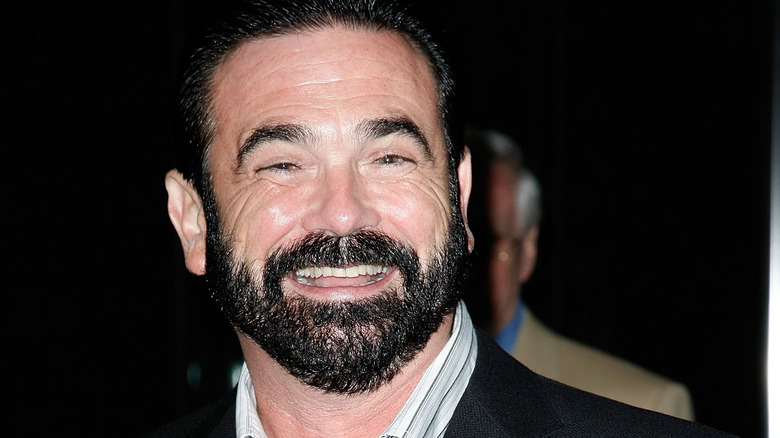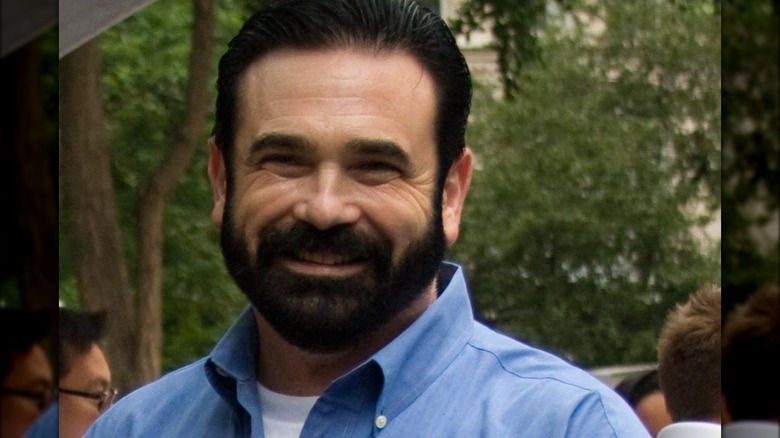What Happened To The Guy From The OxiClean Commercials, Billy Mays?
At one time, it seemed like you couldn't turn the television on without seeing Billy Mays pitching one product or another. He was the ubiquitous pitchman for OxiClean and a plethora of other products, which he enthusiastically demonstrated whenever anyone pointed a camera in his direction. Mays' expertise in demonstrating a product's use and the all but demanding manner in which he compelled people to buy it set him apart as one of the greatest pitchmen of all time.
Mays' career began simply enough, and over time, he padded his resume with one popular product after another. For decades, Mays honed his style and mannerisms with products and potential customers such that he had little to no competition in the market. Granted, Mays wasn't the only person slinging suds or convincing folks to hand over their hard-earned cash for some Kaboom!, but he was arguably the loudest voice in the room.
Mays worked consistently with all kinds of different products from the early eighties until his death in 2009. While he's been off the airwaves for a while now, few have forgotten how his booming voice and charged personality convinced them to buy whatever he was selling. The man some called the "King of the TV Pitch" led an exciting life, and sadly, he had a controversial death. This is what happened to Billy Mays from the beginning of his career to the end.
Mays dropped out of college to work with his dad
William Darrell Mays Jr. may have been the King of the TV Pitch, but he didn't start out that way. Like most people, Mays had a relatively normal upbringing. He was born and raised in Pittsburgh, Pennsylvania, where his father, William Mays Sr., owned and operated a hazardous waste trucking company. After finishing high school, Mays attended West Virginia University, though it's unclear what his major was while he attended school.
Ultimately, Mays dropped out of college before finishing and returned home to Pittsburgh. While mucking about in his hometown, Mays went to work with his father. After a while, Mays grew tired of working at a hazardous waste trucking company and sought his fortunes elsewhere. In 1983, he picked up and moved to Atlantic City, New Jersey, alongside a high school buddy of his who moved to Jersey to take a job in sales.
After relocating to Atlantic City, Mays followed in his friend's footsteps and got into sales. Mays hadn't invented anything (and wouldn't go on to), but he found that he was more than capable of convincing folks to buy whatever he was selling. This served him well, as he cut his teeth working with passersby on the Atlantic City boardwalk, hocking whatever he could get his hands on and sell, helping to establish the skills he'd use throughout the rest of his life.
He sold the Washmatik portable washing device to people on the boardwalk
When Billy Mays moved to Atlantic City, he found employment selling products on the boardwalk. Mays sold everything from Ginsu knives and chamois cloths to mops and cheese graters. But wait ... there's more: he also sold the Washmatik portable washing device and built up his skills while learning from anyone he could find. Mays described his experiences working on the Atlantic City boardwalk during a 2009 interview with TribLIVE News:
"I was there as an apprentice. If you can make it in Atlantic City, you can make it anywhere in the world. (The other salesmen) saw potential in me and gave me a shot. They gave me that gift, and the longer I stayed there, the more I learned. They told me what I was doing wrong; told me it's not just about the product. I pitch today with that in mind."
Mays' work on the boardwalk helped establish the practices he'd use throughout his sales career. He also met numerous people who'd not only help him in the moment; some would remember Mays' work ethic and help him with an important job years later. Mays networked and learned quickly, becoming incredibly successful in a relatively short time. While most salespeople on the boardwalk would tire and finish after a few hours, Mays remained, often selling for much longer than his peers.
Mays attended shows and fairs for 12 years, selling anything and everything
Billy Mays wasn't content selling to passersby on the Atlantic City boardwalk, so he hit the road whenever possible. While he was still learning and establishing himself, Mays worked to find new products to sell and new companies to work with. He spent a dozen years traveling and selling, attending numerous trade shows, auto shows, home shows, and fairs across the country. Mays told Bizjournals, "I sold different products — choppers, cleaning products — whatever was hot."
Mays also sold the Washmatik, a product he'd pitched for over a decade. He's set up at a show and stand there, demonstrating and selling the product to anyone his booming voice and charismatic personality could entice to stop for a moment and hear him out. During this time, Mays had a lot of competition, as he was one of many doing the same thing: capture a person's attention and sell them something they don't know they need.
While most people would see their competitors as ... well, competitors, Mays was different. He'd often lend a hand whenever someone needed help, and while this likely helped him in his personal relationships, it certainly aided his career. One convention changed his life forever because Mays' simple act of kindness launched a friendship that would take him from doing shows on the road to becoming the most well-known TV pitchman in the U.S.
Mays joined the Orange Glo International team in the early '90s
Billy Mays has been known for many products over the years, but only one took him from the trade shows to television. During a show, Mays was busy selling the Washmatik when one of his competitors experienced technical difficulties. Max Appel, the founder of Orange Glo International, was across the way pitching his own products when his microphone broke, and he didn't have a spare. Fortunately for him, Mays did have another one, so he walked over and handed his competition a working microphone.
This simple act of kindness brought the two men together, and they became close friends. While it didn't happen immediately, Appel remembered Mays' professionalism and generosity, so he hired him to sell Orange Glo. Not only did Mays become a salesman for the product, but he also became the company's national spokesman. This significantly boosted Mays' career, as it opened the door for something he'd likely wanted to do for a long time: sell products to more than just a few people passing his booth.
The way he managed to do this was by recording commercials for television. As the company's national spokesman, Mays began appearing on The Home Shopping Network, demonstrating the product to a national audience. This significantly boosted Mays' image, giving him a national audience. People noticed his signature blue shirt, which he wore for continuity, effectively establishing his trademark look for the rest of his career.
He became the OxiClean pitchman in 2000
Billy Mays spent more than a decade refining his skills in front of people at shows, and he used these practices when he made the leap to television. People started to notice Mays, as he always had the same signature look and charismatic approach to selling. Even if you didn't know his name, you'd seen him on television and might even have tried one or more of his products. For many years, Mays was ubiquitous, and you couldn't turn on a television in America without seeing him.
Mays spent several years honing his TV skills, selling all sorts of products on The Home Shopping Network. While he was successful, it would take another product to launch him into the zeitgeist: OxiClean. In 1994, Mays met Anthony Sullivan, and they worked together at various shows and fairs for around five years before hitting the big time with OxiClean — a product that almost sold itself when demonstrated to a captive audience.
Mays and Sullivan captured that audience in 2000 by producing a commercial for the powerful stain remover. Sullivan told People, "That's when the magic happened. Mays was a pitchman, and he was proud of it. He was the hardest working man in television. He stood behind every product he sold." Mays confirmed, "I use 'em all. All I have is my name and the trust that people give me. A product has to do what it says it does on TV, or I won't sell it."
Mays founded Mays Promotions, Inc.
When Billy Mays began making television commercials, he launched his own production company, Mays Promotions, Inc., in Florida. Mays formed the company in 1999 to produce his commercials, and he was its exclusive talent. Mays produced various ads with himself as the on-air talent. Mays Promotions, Inc. was a one-man operation that allowed Mays to do commercials how he wanted to while outsourcing other production roles to companies in the Tampa Bay area.
Mays' first self-produced commercial was made in 1999, though his OxiClean commercial in 2000 truly launched his career. Mays spent a decade filming commercials and infomercials via Mays Promotions, Inc., and during this time, he covered most of Orange Glo's products. Mays' commercials promoted OxiClean, Orange Clean, Orange Glo, and Kaboom!, among others. Eventually, he got into selling the company's various hardware products.
Mays recorded content for everything from vacuum cleaners and wrenches to hands-free cell phone gadgets and mini-burger makers. Many of these products came from other companies, so Mays was able to diversify his products through a number of vendors. Throughout the aughts, Mays' work significantly increased sales for the products he sold. Since he took home a percentage of all of his pitched products' gross revenue, Mays became wealthy.
He got into parodying his work and promoting sports events
It's not hyperbolic to say that Billy Mays was always on television somewhere in the United States throughout the aughts. The man was ubiquitous, and even Mays got sick of seeing himself on television, having once told The Washington Post, "If I see myself one more time today, I'm going to pull my hair out." Granted, he was convalescing after hip replacement surgery, so he'd been sitting in front of the television for quite a while.
Regardless of his opinion on the subject, Mays was everywhere, and when you enter into popular culture, opportunities often arise. For Mays, those opportunities included getting into the world of sports and even occasionally parodying himself. In 2008, Mays launched a campaign for ESPN360.com with four commercials where he parodied himself while convincing viewers to check out ESPN's online service.
One of the ads included his wife and daughter sporting dark, thick beards like Mays, who delivered the message in his signature style. Following up his work with ESPN's online service, Mays appeared at the 2008 Champs Sports Bowl. At the game, he enthusiastically promoted ESPN and ABC's bowl games. While he looked a bit out of place at first, Mays' charismatic approach to promotion made him fit nicely with the athletic atmosphere.
He worked with the Discovery Channel and was set to promote Taco Bell
Billy Mays' career continued to grow toward the end of the aughts, and his presence in popular culture paid off in numerous ways. While many fans spoofed Mays throughout his career and after, Mays never shied away from opportunities that put his face out in the world. It was rare for Mays to walk around in public without being hounded by fans. He told People, "I would never say no to somebody who wanted a picture."
All of the exposure opened doors, including one at the Discovery Channel. Mays worked with his friend and business partner, Anthony Sullivan, to develop "Pitchmen," a series made for the Discovery Channel. "Pitchmen" is a miniseries revolving around the many inventors looking to sell their unique and, ideally, must-have products. The series tracked the progress from the boardroom pitch to sales on the street and, ultimately, the production of an infomercial. Sadly, Mays died before finishing the series, resulting in "Pitchman: A Tribute to Billy Mays" for the 13th episode.
In addition to inking a deal with the Discovery Channel, Mays also lined up a new agreement with Taco Bell. News of the deal broke during an interview Todd "MJ" Schnitt for 99.3 WFLZ had on-air with Sullivan (via TMZ). MJ revealed he'd recently spoken with Mays, who told him about the project. Mays would have filmed several infomercial-style advertisements for Taco Bell. Unfortunately, he never got the chance to fulfill his contract.
Mays died of heart disease exacerbated by drug use in June 2009
Billy Mays's wife found him unresponsive in their Tampa, Florida home on the morning of June 28, 2009. Not long after, he was pronounced dead at the age of 50. Mays had apparently died sometime overnight, but there was no immediate indication of what happened, resulting in an autopsy. The evening before his death, Mays told his wife he wasn't feeling well. He'd sustained a head injury on a flight earlier that day, but it wasn't immediately clear whether his death resulted from his injury.
An initial autopsy the following day found that Mays had hypertensive heart disease, which likely caused his death. In August, a toxicology report listed cocaine as a contributing factor in Mays' passing, which made his death controversial. After the report was made public, Mays' family issued a press release decrying the toxicology report and insisting it included speculative conclusions not backed up by fact, further complicating the controversy surrounding Mays' sudden and unexpected death (via NBC).
Mays' toxicology report indicated cocaine use as a primary contributor to his heart disease and death. It also included numerous therapeutic amounts of painkillers, which Mays took following his hip replacement surgery. The list of medications included oxycodone, tramadol, alprazolam, and diazepam. Mays' final commercials aired posthumously. Sullivan told the Los Angeles Times about the ads following his death, "He'd roll over in his grave if the ads were being pulled off the air."
If you or anyone you know needs help with addiction issues, help is available. Visit the Substance Abuse and Mental Health Services Administration website or contact SAMHSA's National Helpline at 1-800-662-HELP (4357).

